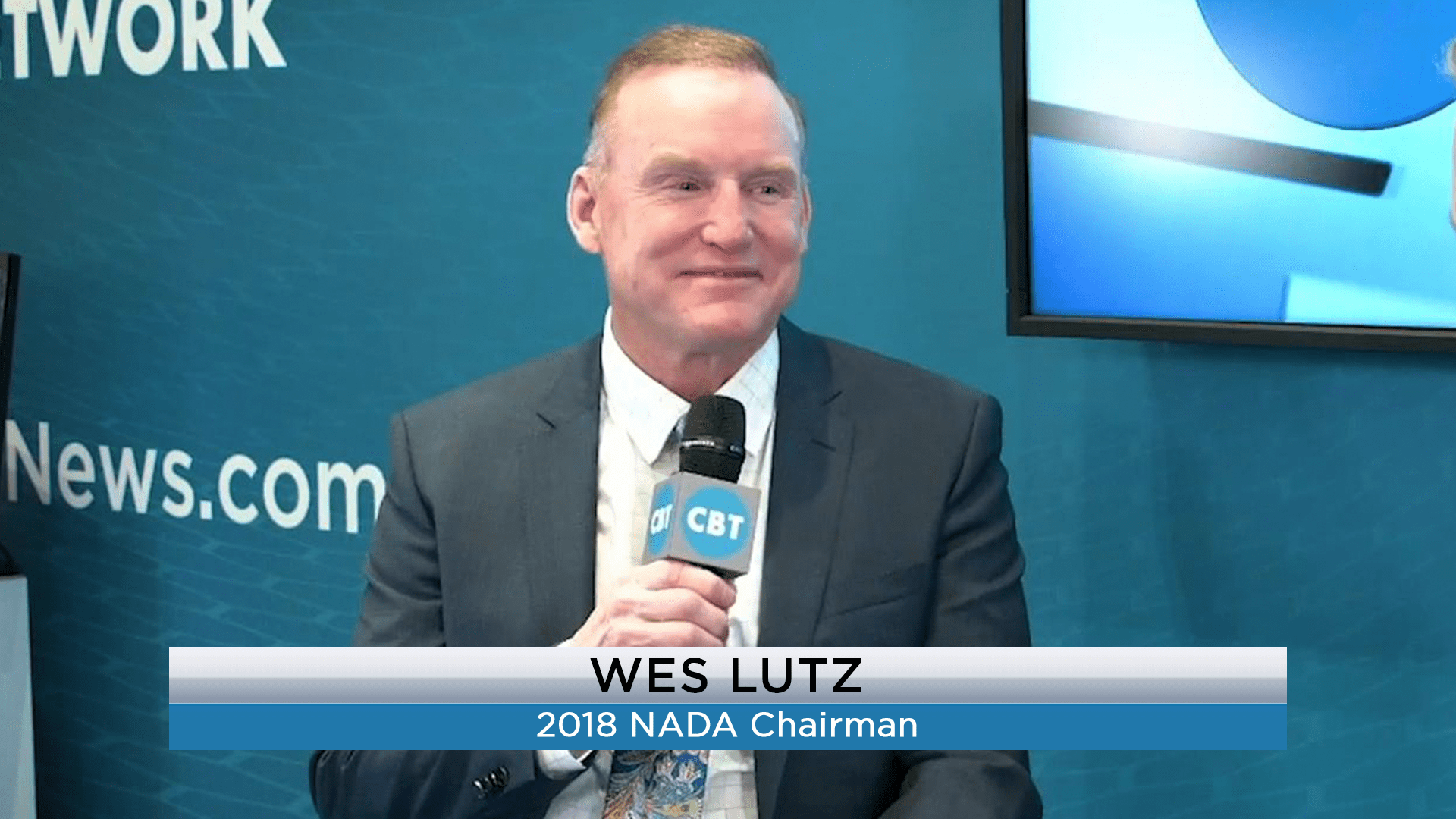The 2019 NADA Convention is officially in the history books, but before it ended we had a chance to catch up with Wes Lutz, the 2018 NADA chairman just before he turned over the gavel to incoming chairman, Charlie Gilchrist.

We talked to Wes about his time as chairman, the high points of his tenure, and some of the challenges NADA faced over the last year.
For more great interviews from the 2019 NADA Show, visit us here!
VIDEO TRANSCRIPT:
Jim Fitzpatrick: We have with us Mr. Wes Lutz, who just finished an incredible year as the chairman, the 2018 NADA chairman. Congratulations on a phenomenal year.
Wes Lutz: Thank you. Thanks. It’s been fun.
Jim Fitzpatrick: Yeah, I bet it has. I bet it has. What did you find to be the most interesting that you didn’t think going in that, “Wow, I didn’t know the chairman did that?”
Wes Lutz: The tariff thing was … That’s big for us, the tariffs.
We didn’t see that one coming. I think the most fun I had this year was a speech I gave to the Automotive Press in Detroit where we talked about rideshare and autonomous vehicles, electrification. That was really fun… That was a great speech to give.
Jim Fitzpatrick: I bet, but we’re going to drill down in this conversation about some of those things because the dealers that are watching, that are here right now walking around, they’ve got that in the back of their mind, things about tariffs and rideshare and some disruptors out there and, “Will my dealership be the same for my kids in 20 years that it is today?”
Jim Fitzpatrick: It will be.
Jim Fitzpatrick: Talk to us about that.
Wes Lutz: I mean, I think the big thing you’re reading is about autonomous vehicles and how three years from now or two years from now we’re going to have fully autonomous vehicles.
The latest predictions that I’m seeing that I think are accurate are level four by 2030 and full autonomy by 2050. At my age, I’m not worried about autonomous vehicles by 2050, but I think that the media’s hype is a little bit the technology that we have, that we really don’t have yet.
Jim Fitzpatrick: That’s right.
Wes Lutz: It’s coming.
Wes Lutz: We’re getting ready for it, but it’s not going to happen tomorrow.
Jim Fitzpatrick: That’s right. That’s right. One thing you touched on were the tariffs, and I think the dealers are still, OEMs and dealers alike, they’re, “What does this mean, you know, for our industry? Is it going to shut us down?” Talk to us a little bit about that, where we stand currently on the tariff deal.
Wes Lutz: There’s I think five trade agreements, and they’re working through … They’ve worked through pretty much three of them.
Jim Fitzpatrick: Right.
Wes Lutz: China is still big. Europe is still big, but they’re making progress. I think, for the first time that I’ve ever seen, the OEMs, the dealers, all of the players in the market are opposed to tariffs, and we’ve got a great coalition in Washington letting our position …
Jim Fitzpatrick: Oh, I know. I know.
Wes Lutz: … to be known… I mean, it’s really detrimental. It puts a lot of pressure on pricing. Pricing is very sensitive for customers.
Jim Fitzpatrick: I know. I know. Yep, in fact, speaking about pricing, there’s a lot of talk about margin compression, and I know this is near and dear to your heart. Dealers are saying, “Man, we just can’t make money on these vehicles. We can do it on used cars and in finance and service and such,” which is great, but …
Wes Lutz: Yes.
Jim Fitzpatrick: … talk to us a little bit about that issue of margin compression as dealers try to navigate through that.
Wes Lutz: As an industry, we just don’t feel the stair-steps are good for the consumer, and I don’t think they’re good for dealers. It makes variable pricing to different … at different times in the month for the consumers, which we think is unfair.
Wes Lutz: We’ve done a roadshow with all of the manufacturers where we’ve done our research and present a pretty good business reason to not use stair-steps…
That’s put a lot of compression on the margins because it’s all or none for most programs and, if you’re not going to get there, you just really drop the numbers, the prices, to hit your numbers, but it’ll work itself out. I think it will work itself out.
Jim Fitzpatrick: Yeah. Sure. Sure. I know that, in large part, you guys do at NADA a phenomenal job representing dealers nationwide, and I know that it’s always the initiative of chairmen when they go and get … to see if they can get more participation from its members. Do you have that, a little bit of that frustration that-
Wes Lutz: No. I do. We’re politically active. As a trade association, 92% of the dealers or over 90% of the dealers are members of NADA, so we’re really well-represented.
Jim Fitzpatrick: Yeah, that’s for sure.
Wes Lutz: We need participation especially from younger members. They tend to be the ones doing the heavy lifting in the stores…
While I’m here on camera with you …
Jim Fitzpatrick: It’s so true.
Wes Lutz: … somebody is at the store … doing all the work, right?
Jim Fitzpatrick: That’s right.
Wes Lutz: It’s important that we get that feedback from those younger people, our coworkers because they see things differently …
Jim Fitzpatrick: They do.
Wes Lutz: … sometimes than we do as dealers.
Jim Fitzpatrick: They see the future.
Wes Lutz: They do.
Jim Fitzpatrick: Let’s talk about that. There’s been a lot of talk about disruption in the auto industry with rideshare companies and, now, you’ve got Ford in the scooter and bicycle business, and so now it’s all about mobility. Are we going to see a day that cars will be drastically dropped because people are not buying them as much?
Wes Lutz: You have to credit the market. There’s always something new…. Subscriptions are better.
Jim Fitzpatrick: That was next on my list.
Wes Lutz: Oh, okay, subscriptions, they’re working themselves out in the market.
Jim Fitzpatrick: Right, they are.
Wes Lutz: It seems like maybe a higher end product subscription is maybe better, but a price point, a lower price when a … commodity price point, it seems to be working so great. It’s just not working that well, but there’s always ride-hailing. You said, “Ridesharing.” Ride-hailing. I use Uber. I use Lyft .. … but I like driving my own car.
Jim Fitzpatrick: You still have a car. Right.
Wes Lutz: If you’ve got two kids with car seats, it makes it tough to get into an Uber, but-
Jim Fitzpatrick: It does. It does.
Wes Lutz: I think we’re safe for vehicle ownership.
80 million units sold last year globally, a great [SAR 00:05:11], over 17 million last year.
Jim Fitzpatrick: I know.
Wes Lutz: We’re predicting 16.8 this year, a great SAR, so I’m really not concerned that people are going to start … stop driving cars.
Jim Fitzpatrick: It is interesting to hear the media talk about headwinds in the industry, and then we’ll say, “It looks like it’s going to be 16 million.” “16 million? What … Are you kidding me?” That’s a heyday.
Wes Lutz: It is.
Jim Fitzpatrick: We’re very blessed in this industry, aren’t we?
Wes Lutz: We are. It’s been a great industry.
Jim Fitzpatrick: There’s no question about it. Before I let you go here, I just want to run some of these other ideas by you and some concepts that are out there such as the Carvana business model where somebody can do it all right there in their living room and the vehicle is delivered to them. Do you see that either, A, as a threat or, B, as a challenge for dealers to get on the digital retailing?
Wes Lutz: We’ve been franchise dealers for over 100 years, 101 years.
…We love change, and it just challenges you to be better and, ultimately, the consumer has to win, and if we do everything that we do, we keep the consumer in mind, we make it a better customer experience, we’ll have a future, and we’ve been doing that for years as auto dealers, and that’s not going to change.
Jim Fitzpatrick: Right. Right.
Wes Lutz: I think we’re the most cost-effective, customer-friendly way to deliver cars…
Jim Fitzpatrick: Sure. No question. What would you say stands out as your greatest achievement in 2018 as a chairman?
Wes Lutz: I will say I didn’t screw anything up.
Jim Fitzpatrick: Great job, right?
Wes Lutz: I have two more days, so I still have an opportunity. There were a lot of challenges this year, and I was particularly proud of the way we handled the tariffs and organizing and getting the whole industry behind that. That was good, and we’ve done a lot of outreach to women and minorities especially in our organization, but throughout the industry. We’ve promoted that, and I’m very proud of that as well.
Jim Fitzpatrick: Yeah. What advice do you have to Charlie coming up as the next chairman behind you?
Wes Lutz: He’s so smooth. He’s going to do a great job. It’s really nice to hand it over to Charlie. He doesn’t need any advice.
Jim Fitzpatrick: He doesn’t need any.
Wes Lutz: He is a smart guy. Yeah, I’m really happy to have him.
Jim Fitzpatrick: Just do what’s in your heart.
Wes Lutz: Yeah. He’s going to do a great job.
Jim Fitzpatrick: Wes Lutz, I want to thank you so much first for your leadership over the last year at NADA and then certainly for your time here at CBT News. We very much appreciate it.
Wes Lutz: Thank you very much.
Jim Fitzpatrick: Thank you and congratulations.








